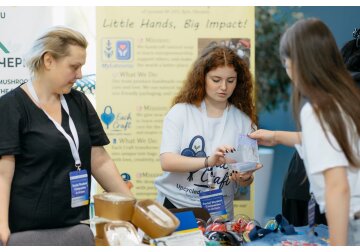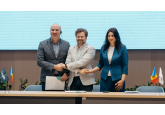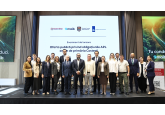
From classroom to community: the rise of young social entrepreneurs through EU4Youth
Forty-five young people from Moldova, Georgia, and Ukraine became entrepreneurs while still in school. This was made possible by the “Building Back Better through Social Entrepreneurship” project, which was implemented by Junior Achievement as part of the EU4Youth programme. The project trained over 2,200 students and nearly 300 teachers in social entrepreneurship, and 45 of them won grants to start their own businesses. A total of 45 social enterprises were established: 15 in Moldova, 15 in Georgia, and 15 in Ukraine.
Sustainable ideas taking root in Moldova
Oxana Casian, an EU4Youth grant winner from the Republic of Moldova, developed a social enterprise that repurposes textiles no longer used in daily life. Through this initiative, forgotten or discarded materials are given a second life when they are transformed into original, durable products, such as bags, accessories, restyled clothing, blankets, and home decorations. Financial support will help Oxana develop her business, create new jobs in the community, and promote an eco-friendly consumption and production model.
“After winning the grant, we plan to invest in equipment to improve the quality of our services”, says Oxana Casian.
Through this project, Oxana hopes to reduce waste and educate the community about reuse and sustainability, thereby making a significant impact on the community. She also hopes to promote social inclusion and provide affordable products to vulnerable families.
“This project is beneficial for young people who want to start a social business, just as we had the chance to start from scratch, thanks to the mentorship and support received”, Oxana noted.
Social impact and inclusion in Ukraine
Social entrepreneurship is an innovative form of civic and economic engagement that combines business goals with social missions to respond to community needs. Through these initiatives, young people create jobs and actively contribute to inclusion, equity, and environmental protection. One relevant example is the project launched by the winners in Ukraine, who established a workshop that produces adaptive clothing for people with disabilities. In Ukraine, where the war has dramatically increased the number of people with disabilities, projects like this one are vitally important.
“We came to this project with the idea of adaptive clothing that helps people with disabilities feel stylish and, most importantly, comfortable”, says Vlada Tatarchenko, EU4Youth grant winner from Ukraine.
Clothing designed specifically for people with limited mobility or other disabilities will contribute to their comfort, dignity, and social integration. Young entrepreneurs will experience deep financial and moral satisfaction knowing they have brought real, positive change to their community.
“Our mission is to create a barrier-free environment and improve the emotional well-being of people with disabilities through beautiful and quality clothing”, says Roman Kifa, EU4Youth grant winner from Ukraine.
According to Roman Kifa, anyone can do social entrepreneurship; you just have to dare.
“We want to tell beginners in social entrepreneurship that everything is in their hands. Don’t be afraid, social entrepreneurship is something anyone can do. Create change in your communities and transform lives for the better through social entrepreneurship!”, noted Roman.
Opportunities created by youth for youth, in Georgia
Young people in Georgia paid attention to what was happening around them and started a project that is already making a difference in the community. They created “World Trip”, an innovative platform that connects students looking for jobs and meets a real need.
“We created a social enterprise because we noticed something was missing. Students around us had time, energy, talent, but no opportunities to use them. World Trip is our answer. It’s a platform that connects young people with seasonal jobs in tourism and services, while also helping local businesses grow”, says Sandro Kvizhinadze, EU4Youth grant winner from Georgia.
“World Trip” is more than just a job portal, it's a platform that promotes personal and professional development. Students gain work experience, improve their communication skills, discover new places, and actively integrate into the real economy.
#EU4Youth – an investment in the future of youth
The “Building Back Better through Social Entrepreneurship” project aimed to provide Moldovan, Georgian, and Ukrainian students with real access to entrepreneurial education, support in launching social businesses, and concrete professional development opportunities. Junior Achievement Europe representatives emphasize that the project’s success was possible thanks to a training- and education-centered approach. By training teachers, the program’s impact was multiplied and quickly reached hundreds of students in the three countries.
“We wanted to do something truly meaningful in Moldova, Ukraine, and Georgia. We wanted to see how social entrepreneurship could have a local impact and how we could create a new model. We started step by step, training teachers, who in turn trained the youth”, says Diana Filip, Deputy General Director, Junior Achievement Europe.
“The EU4Youth program supports young people in many areas – one of them is active engagement, and another is youth employment and entrepreneurship. It brings together different experiences from Eastern Partnership countries and combines them with the experience of EU countries”, notes Austėja Vilkelytė, Deputy Director of the International Development Cooperation Division, CPVA.
The EU4Youth programme is a strategic, long-term investment in the future of young people in the region. It fosters an engaged and educated generation that can respond to socio-economic challenges. The programme focuses on the personal development and professional integration of young people, particularly through social entrepreneurship and practical education. Over the years, the programme has brought together stakeholders from various fields, fostering collaboration between Eastern Partnership states and the European Union.
The EU4Youth Phase III Youth Employment and Entrepreneurship programme, funded by the European Union and the Ministry of Foreign Affairs of Lithuania, is being executed by the Central Project Management Agency (CPVA) in Eastern Partnership countries. These include Armenia, Azerbaijan, Belarus, Georgia, Moldova, and Ukraine. The programme will run until the middle of 2026 and aims to provide technical assistance to governmental and non-governmental organisations to tackle youth unemployment and improve employability.







